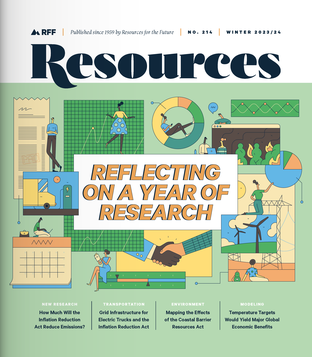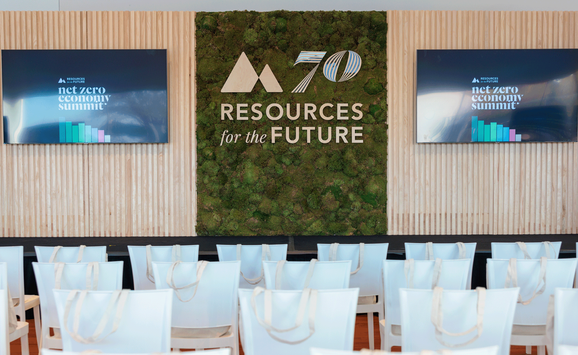
Winter 2023/24 / Magazine Issues
Issue 214: Reflecting on a Year of Research
A Note from RFF’s President about Resources issue 214:
Monumental climate legislation emerged in the summer of last year—which also happened to mark 70 years of dedication to RFF’s mission. Whereas RFF’s 70th anniversary had me thinking about the entire history of the organization, over the past few months, I’ve been thinking about my own legacy here and the opportunities for RFF into the future. As you may have heard in September, after seven years at the helm of RFF, I will be stepping down as president and CEO within the next several months.
Meanwhile, I continue to be filled with gratitude for the privilege of working with and leading such a remarkable team. RFF is consistently ranked #1 globally among the top institutions in the fields of environmental and energy economics and is helping decisionmakers at all levels with actionable climate solutions. We need the economy to work for people and the climate—RFF helps make that possible. I am confident that RFF will continue to flourish under new leadership and am committed to helping ensure a successful transition.
As RFF’s Board of Directors launches the search for RFF’s next president and CEO, and we wrap up another calendar year, it’s a good opportunity for reflection. We’ve therefore created this winter issue of Resources magazine as a chance to pause and look back on the past year at RFF and our work. What you’ll find among these pages are some of our favorite blog posts and podcast episodes that RFF scholars have been publishing since the last winter issue of Resources.
One of those pieces is particularly relevant to this year’s Conference of the Parties (COP28), which marks the conclusion of the world’s first global stocktake. The stocktake measures the progress of nations toward emissions-reduction goals in the Paris Agreement and considers what further actions will be needed to meet these goals. RFF’s analysis has found that holding global temperature rise to well below 2°C would produce roughly $5.2 trillion per year of annualized benefits through 2300; holding the increase to 1.5°C would produce benefits of roughly $6.8 trillion per year. These are big numbers; the dollar figures demonstrate the scale of action that is warranted to address the risks created by greenhouse gas emissions and climate change.
RFF’s research and policy engagement has accomplished much over the past year, and I look forward to what’s next on our path toward a healthy environment and thriving economy.
Richard G. Newell
President and CEO, Resources for the Future
Articles in this issue
Achieving the Paris Agreement Temperature Targets Would Yield Major Global Economic Benefits

How Much Will the Inflation Reduction Act Reduce Emissions?

Zero-Emission Trucks and the Inflation Reduction Act: Incentives for Upgrading Electricity Infrastructure to Handle a Growing Share of Large Electric Vehicles

What Is an “Energy Community”?

Hydrogen In Focus

Disclosing Wildfire Risks in Home Sales

Geeking Out on Geography: Mapping the Effects of the Coastal Barrier Resources Act

Power-Sector Pollution Targeted by New Regulations from the US Environmental Protection Agency

A Year of Events

What’s at the Top of Your Stack?

Supporter Spotlight: Active Engagement Produces Impact
